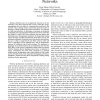Free Online Productivity Tools
i2Speak
i2Symbol
i2OCR
iTex2Img
iWeb2Print
iWeb2Shot
i2Type
iPdf2Split
iPdf2Merge
i2Bopomofo
i2Arabic
i2Style
i2Image
i2PDF
iLatex2Rtf
Sci2ools
120
click to vote
INFOCOM
2003
IEEE
2003
IEEE
On-demand Power Management for Ad Hoc Networks
— Battery power is an important resource in ad hoc networks. It has been observed that in ad hoc networks, energy consumption does not reflect the communication activities in the network. Many existing energy conservation protocols based on electing a routing backbone for global connectivity are oblivious to traffic characteristics. In this paper, we propose an extensible on-demand power management framework for ad hoc networks that adapts to traffic load. Nodes maintain soft-state timers that determine power management transitions. By monitoring routing control messages and data transmission, these timers are set and refreshed on-demand. Nodes that are not involved in data delivery may go to sleep as supported by the MAC protocol. This soft state is aggregated across multiple flows and its maintenance requires no additional out-of-band messages. We implement a prototype of our framework in the ns-2 simulator that uses the IEEE 802.11 MAC protocol. Simulation studies using our sc...
Related Content
| Added | 04 Jul 2010 |
| Updated | 04 Jul 2010 |
| Type | Conference |
| Year | 2003 |
| Where | INFOCOM |
| Authors | Rong Zheng, Robin Kravets |
Comments (0)

